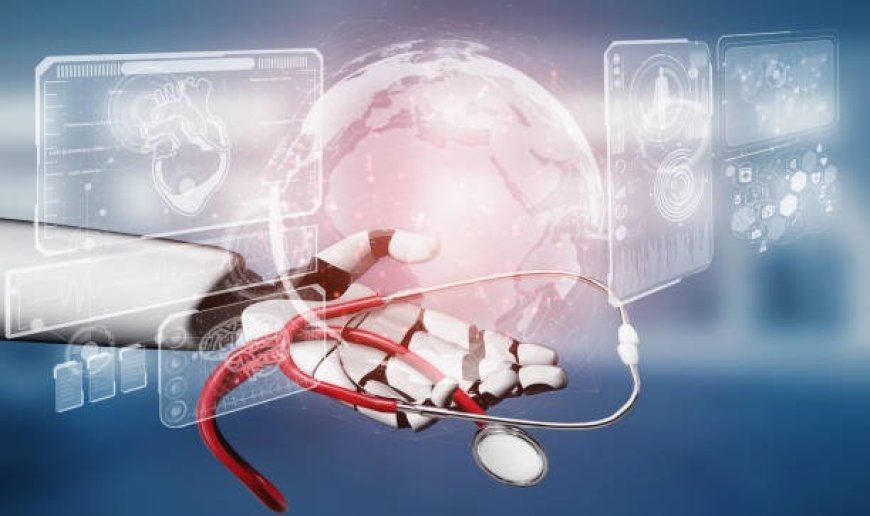The Impact of Artificial Intelligence on Healthcare: Revolutionizing Diagnosis and Treatment
AI is transforming healthcare by enhancing diagnosis accuracy, personalizing treatments, and improving patient outcomes globally.

Artificial Intelligence (AI) is no longer a concept of the future it’s transforming industries today, especially in healthcare. From diagnosing diseases faster than human doctors to predicting treatment outcomes with high accuracy, AI is revolutionizing how medical professionals approach patient care. The introduction of AI into healthcare has not only streamlined administrative tasks but has also opened up exciting possibilities for improving clinical outcomes, enhancing patient experiences, and driving efficiencies within the healthcare system. In this article, we will explore how AI is being integrated into healthcare, its potential benefits, and the future it promises in reshaping medical treatments and diagnoses.
The Role of AI in Healthcare Diagnostics
One of the most significant ways AI is transforming healthcare is through improved diagnostic tools. Traditionally, healthcare professionals have relied on their expertise, clinical experience, and diagnostic tests to make informed decisions about a patient's health. However, AI models can now analyze large amounts of medical data more quickly and accurately than humans, providing an additional layer of support for healthcare providers.
AI has been particularly useful in areas like radiology, where AI-powered systems can analyze medical imaging (such as X-rays, MRIs, and CT scans) to identify patterns that may not be visible to the human eye. For example, AI has demonstrated its ability to detect early signs of cancers such as breast cancer, lung cancer, and skin cancer, allowing for earlier interventions that can significantly improve patient outcomes. Moreover, these AI systems can reduce diagnostic errors and enhance the overall accuracy of medical imaging.
Patient Data Analysis: AI's ability to analyze large datasets is helping doctors make more informed decisions based on patterns, trends, and correlations that would otherwise go unnoticed. For instance, AI algorithms can analyze patient medical histories, genetic data, and lab results to predict the likelihood of future health issues, such as heart disease or diabetes. This predictive capability allows for more personalized treatment plans and proactive care.
As more healthcare data is generated, it’s crucial for medical professionals to manage and share it effectively. Tools like wmv to MP4 converters can help healthcare professionals efficiently store and share digital content like medical videos, training materials, and patient records. With the increasing adoption of AI, the ability to seamlessly manage data and share critical information is vital for improving care coordination and patient outcomes.
Enhancing Personalized Medicine with AI
Another groundbreaking application of AI in healthcare is personalized medicine. Personalized medicine, also known as precision medicine, tailors treatment based on a patient’s individual characteristics, such as their genetic makeup, lifestyle, and environment. AI plays a crucial role in making personalized medicine a reality by analyzing genetic data, helping doctors understand how specific genes might affect a patient’s response to certain treatments.
For example, in oncology, AI can analyze a patient's genetic profile to identify the most effective chemotherapy drugs for their specific cancer type. It can also predict how the patient’s body will react to certain drugs, minimizing adverse reactions and improving the likelihood of a successful treatment. AI’s ability to process vast amounts of complex data has made personalized medicine more accessible and has the potential to significantly improve treatment outcomes.
Drug Development: AI is also accelerating drug discovery and development. By using machine learning models to analyze existing drugs, patient outcomes, and clinical trial data, AI can help researchers identify promising drug candidates more quickly. This has the potential to drastically reduce the time and cost required to bring new drugs to market. During the COVID-19 pandemic, AI helped identify treatments and vaccine candidates in record time, showcasing its ability to provide quick solutions during global health crises.
AI in Surgical Procedures
AI is revolutionizing not only diagnostics and treatments but also surgical procedures. Surgeons are increasingly using AI-powered robotic systems to assist in complex surgeries. These robotic systems are designed to enhance precision, reduce human error, and minimize recovery time for patients. In some cases, AI is used to guide the surgeon’s hand during procedures, ensuring that every movement is accurate.
AI also helps in planning and simulating surgical procedures before they take place, which allows for better preparation and fewer complications during actual surgeries. By analyzing medical images, AI can map out the exact locations for incisions, identify critical structures like nerves or blood vessels, and even suggest optimal approaches for surgery. This can result in less invasive procedures and faster recovery times for patients.
The Future of AI in Healthcare: Challenges and Opportunities
As AI continues to evolve, its potential applications in healthcare will expand even further. The future of AI in healthcare holds tremendous promise, from AI-powered virtual health assistants that can monitor patients’ conditions remotely to advanced predictive models that could prevent diseases before they even develop.
Remote Patient Monitoring: AI is expected to play a significant role in telemedicine and remote patient monitoring. With the rise of wearable devices, patients can track vital signs like heart rate, blood pressure, and glucose levels in real-time. AI algorithms can analyze this data and alert patients and doctors to potential health issues before they become serious. This technology will be especially valuable for patients with chronic conditions who require ongoing monitoring.
However, while the benefits of AI in healthcare are vast, there are still challenges that need to be addressed. Issues such as data privacy, the need for extensive training in AI systems, and the potential for algorithmic bias must be resolved to ensure that AI can be used safely and ethically in healthcare settings.







